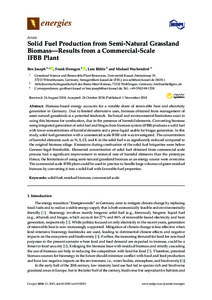Aufsatz

Solid Fuel Production from Semi-Natural Grassland Biomass - Results from a Commercial-Scale IFBB Plant
Zusammenfassung
Biomass-based energy accounts for a notable share of renewable heat and electricity generation in Germany. Due to limited alternative uses, biomass obtained from management of semi-natural grasslands is a potential feedstock. Technical and environmental limitations exist in using this biomass for combustion, due to the presence of harmful elements. Converting biomass using integrated generation of solid fuel and biogas from biomass system (IFBB) produces a solid fuel with lower concentrations of harmful elements and a press liquid usable for biogas generation. In this study, solid fuel generation with a commercial scale IFBB unit was investigated. The concentration of harmful elements such as N, S, Cl, and K in the solid fuel was significantly reduced compared to the original biomass silage. Emissions during combustion of the solid fuel briquettes were below German legal thresholds. Elemental concentration of solid fuel obtained from commercial scale process had a significant improvement in removal rate of harmful elements than the prototype. Hence, the limitations of using semi-natural grassland biomass as an energy source were overcome. The commercial scale IFBB plant could be used in practice to handle large volumes of green residual biomass by converting it into a solid fuel with favorable fuel properties.
Zitierform
In: Energies 2018 / 11 (2018-11-01) , S. 3011 ; 1996-1073Förderhinweis
Gefördert durch den Publikationsfonds der Universität KasselZitieren
@article{doi:10.17170/kobra-20190130130,
author={Joseph, Ben and Hensgen, Frank and Bühle, Lutz and Wachendorf, Michael},
title={Solid Fuel Production from Semi-Natural Grassland Biomass - Results from a Commercial-Scale IFBB Plant},
journal={Energies},
year={2018}
}
0500 Oax 0501 Text $btxt$2rdacontent 0502 Computermedien $bc$2rdacarrier 1100 2018$n2018 1500 1/eng 2050 ##0##http://hdl.handle.net/123456789/11052 3000 Joseph, Ben 3010 Hensgen, Frank 3010 Bühle, Lutz 3010 Wachendorf, Michael 4000 Solid Fuel Production from Semi-Natural Grassland Biomass - Results from a Commercial-Scale IFBB Plant / Joseph, Ben 4030 4060 Online-Ressource 4085 ##0##=u http://nbn-resolving.de/http://hdl.handle.net/123456789/11052=x R 4204 \$dAufsatz 4170 7136 ##0##http://hdl.handle.net/123456789/11052
<resource xsi:schemaLocation="http://datacite.org/schema/kernel-2.2 http://schema.datacite.org/meta/kernel-2.2/metadata.xsd"> 2019-01-31T10:54:32Z 2019-01-31T10:54:32Z 2018-11-01 doi:10.17170/kobra-20190130130 http://hdl.handle.net/123456789/11052 Gefördert durch den Publikationsfonds der Universität Kassel eng Urheberrechtlich geschützt https://rightsstatements.org/page/InC/1.0/ solid fuel residual biomass commercial scale 630 Solid Fuel Production from Semi-Natural Grassland Biomass - Results from a Commercial-Scale IFBB Plant Aufsatz Biomass-based energy accounts for a notable share of renewable heat and electricity generation in Germany. Due to limited alternative uses, biomass obtained from management of semi-natural grasslands is a potential feedstock. Technical and environmental limitations exist in using this biomass for combustion, due to the presence of harmful elements. Converting biomass using integrated generation of solid fuel and biogas from biomass system (IFBB) produces a solid fuel with lower concentrations of harmful elements and a press liquid usable for biogas generation. In this study, solid fuel generation with a commercial scale IFBB unit was investigated. The concentration of harmful elements such as N, S, Cl, and K in the solid fuel was significantly reduced compared to the original biomass silage. Emissions during combustion of the solid fuel briquettes were below German legal thresholds. Elemental concentration of solid fuel obtained from commercial scale process had a significant improvement in removal rate of harmful elements than the prototype. Hence, the limitations of using semi-natural grassland biomass as an energy source were overcome. The commercial scale IFBB plant could be used in practice to handle large volumes of green residual biomass by converting it into a solid fuel with favorable fuel properties. open access Joseph, Ben Hensgen, Frank Bühle, Lutz Wachendorf, Michael doi:10.3390/en11113011 publishedVersion 1996-1073 11 Energies 3011 2018 </resource>
Die folgenden Lizenzbestimmungen sind mit dieser Ressource verbunden:
Urheberrechtlich geschützt

